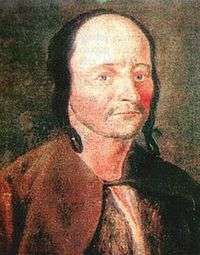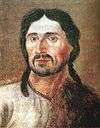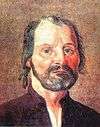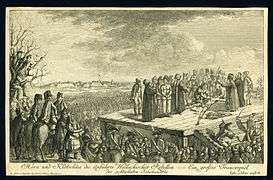Revolt of Horea, Cloșca and Crișan



The Revolt of Horea, Cloșca and Crișan (31 October 1784 – 14 December 1784) began in Zaránd County, Transylvania, but it soon spread throughout all Transylvania and the Apuseni Mountains.
The leaders were Horea (Vasile Ursu Nicola, 1731–1785), Cloșca (Ion Oargă, 1747–1785) and Crișan (Marcu Giurgiu, 1733–1785).
As long as the Gubernium and the military leadership debated about a possible intervention - awaiting the order from Vienna, the Hungarian nobility organized it's defence, they trialed in Déva (Deva) and executed 56 captured peasants.[1]
As Joseph II, Holy Roman Emperor ordered the army to intervene, the uprising was ended by Horea on 14 December 1784, at Câmpeni (German: Topesdorf; Hungarian: Topánfalva). Afterwards, in January 1785, the leaders were captured by treason. From the more than 600 captured rebels 120 were sentenced, 37 death penalty was delivered initially but they were changed to imprisonment as a result of the amnesty of the Emperor, with an exception regarding the three leaders.[1][2] Horea and Cloșca were executed by the Hungarian authorities by breaking on the wheel on 28 February 1785 at Dealul Furcilor (Forks Hill), Alba-Iulia. Crișan hanged himself on the night before the execution.
 The execution of Horea and Cloșca
The execution of Horea and Cloșca The wooden church in Horea's village
The wooden church in Horea's village
References
- 1 2 "Kitör a Horea és Cloşca vezette felkelés". www.mult-kor.hu.
A Gubernium és a főhadparancsnokság egymással vitázott; Bécsből vártak utasítást. Közben a vármegyei nemesség megszervezte önvédelmét, Dévánál kisebb győzelmet aratott a felkelők fölött, 56 elfogott parasztot kivégeztek.
- ↑ Tamás, Tarján M. "The execution of Horea and Closca in Alba Iulia". www.rubicon.hu.
Sources
- Pascu, Ștefan (1984). Revoluția populară de sub conducerea lui Horea. București: Editura Militară. p. 534.
The definitive work on this topic is David Prodan, Rascoala lui Horea. Bucharest: Editura Stiintifica si Enciclopedica, 2 vols, 1979.
External links
| Wikimedia Commons has media related to Horea, Cloşca and Crişan. |